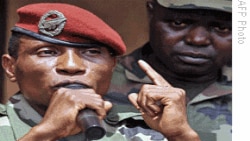Guinea's military government says it is launching an investigation into who ordered security forces to open fire on demonstrators Monday, killing at least 157 people. Former colonial power France has cut military assistance following the attack against demonstrators protesting the expected presidential candidacy of the country's military ruler.
Military leaders in Guinea say they will investigate what happened at Conakry's main stadium Monday when government forces opened fire on opposition demonstrators.
An Interior Ministry statement late Thursday put the death toll at just 57, only four of them killed by bullets. The rest, it said, were trampled or died of asphyxiation.
Human rights groups in Guinea say at least 157 people were killed when members of the presidential guard shot into crowds of demonstrators to break-up the unauthorized protest. The final death toll may never be known as soldiers have already collected bodies themselves rather than allow them to be counted at public morgues.
French Foreign Minister Bernard Kouchner says Paris is immediately suspending military cooperation with the government in Conakry and is reviewing its entire bilateral aid package.
Kouchner says the European Union will meet Wednesday to look at additional measures that could be taken swiftly, particularly against individual members of the ruling military council.
U.S. President Barack Obama's administration condemns what it calls a brazen and inappropriate use of force against civilians. Deputy U.S. State Department Spokesman P.J. Crowley says Washington is deeply concerned about the general breakdown of security.
"We encourage the Guinean government to exercise restraint and insure the safety and security of all Guineans and foreign nationals," said P.J. Crowley. "We are very concerned about violations of basic human rights and call upon the regime to release all political prisoners. Obviously the reports of deaths, now over 150, [represent] a very, very significant loss of life and are of a great concern to us."
The Economic Community of West African States wants an international inquiry into the violence that includes the African Union and the United Nations Commission for Human Rights.
Instability in Guinea has raised concerns in neighboring Sierra Leone and Liberia - both still recovering from their own violent conflicts. Sierra Leone President Ernest Koroma says isolating Guinea at this time of political crisis will only make things worse.
"At this time in the critical developments of Guinea, we should ensure that the international community, ECOWAS, and the Manu River Union stay engaged with Guinea," said Ernest Koroma. "We must ensure that we help Guinea to restore a democratic process."
Facing the most violent repression of political dissent since taking power in a coup nine months ago, military leader Captain Moussa Dadis Camara has tried to distance himself from the killing, saying he did not know what was happening.
In a series of interviews since the violence, he has said he wanted to go the stadium himself but was told it was not safe. He says he can not control elements of Guinea's military responsible for what he is calling those atrocities.
It is a dramatic admission for a man who has ruled Guinea largely single-handedly since December. He has previously forced soldiers to crawl on their knees, begging for his forgiveness. Captain Camara has presided over a series of televised interrogations of previous government officials and shouted down the German ambassador for expressing European Union concerns that he might run for president next year.
By distancing himself from violence carried out by members of his own presidential guard, Captain Camara appears willing to give up those responsible for the killing if it restores some of the public confidence he gained early on by vowing to fight corruption.
The Interior Ministry statement says Captain Camara Tuesday expressed his condolences to the families of those killed in the violence and visited some of the injured at two hospitals.
Human Rights Watch says Captain Camara must hold accountable those responsible for opening fire on peaceful demonstrators. Corrine Dufka heads the group's operations in West Africa.
"Dadis Camara has attributed these acts to uncontrolled elements within the military," said Corrine Dufka. "This is completely and utterly unacceptable. This sounded like a well-organized operation."
On taking power, Captain Camara said none of the coup leaders would stand for political office. The ruling miliary council has since declared that everyone is eligible to run in next year's presidential and legislative elections.
While Captain Camara has not formally declared his candidacy, he has told supporters that he will not insult them by ignoring their demands that he run.
Dufka says the likelihood of Captain Camara's candidacy sparked Monday's protests.
"The Guinean people have lived through two long, authoritarian, brutal and corrupt regimes, and they are fed up," she said. "They want elections. They want free and fair elections, in which the process is dominated by civilians and not by the military."
The French government says Captain Camara deciding not to run would allow for calm to return. The U.S. government is calling on Guinea's ruling military council to respect its previous commitment to not field candidates in the election.
News
Guinea Launches Investigation Into Killing of Protesters
update

<!-- IMAGE -->








